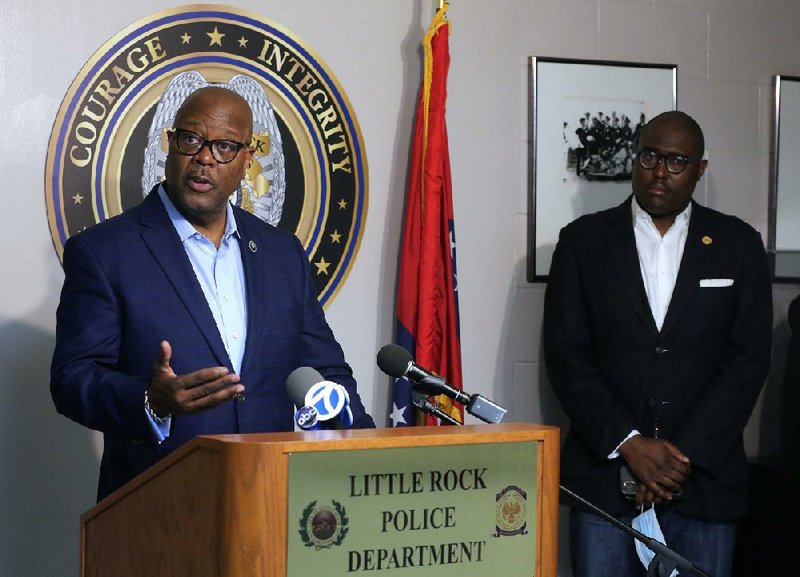Two police chiefs clashed before Arkansas lawmakers Monday at a meeting about recent protests in Little Rock that led to property damage, including vandalism of the state Capitol building.
In more than three hours of testimony before Senate and House committees on City, County and Local Affairs, Little Rock Police Chief Keith Humphrey and state Capitol Police Chief Darrell Hedden traded barbs over their agencies' handling of the demonstrations that took place in late May and early June following the death of Minneapolis man George Floyd.
Hedden, who leads a 22-officer team, accused Humphrey's agency of providing insufficient support during the weekend of May 30, when he said his officers felt their safety threatened.
He compared the protests to "the Vietnam War come to Little Rock, Arkansas."
"This building that we work in, and that we call our home, was going to be burned to the ground, I felt like," he said.
He and Humphrey didn't speak during the events, he said. He expressed concern Humphrey might have passed on intelligence to demonstrators. Hedden said he saw the chief and Little Rock mayor Frank Scott Jr. briefly join a protest group one evening.
Humphrey, however, said Hedden "lied" to lawmakers, mischaracterizing both the size of the protest and the Little Rock police agency's response.
Little Rock officers were on the scene and also responded to related incidents around the area, Humphrey said.
While Humphrey acknowledged he'd met with protesters, he argued that it was absurd to suggest he and Scott had somehow incited or were allied with the group.
"To have a peer sit here and call me 'that man' and say that he does not trust me, that is insulting," Humphrey said. "It's borderline xenophobic, it's very disrespectful."
He said Hedden hadn't fulfilled his own responsibility to meet with demonstrators, and accused him of being absent from a unified command center at an Arkansas State Police office.
The Little Rock protests that stretched more than a week and involved hundreds of participants were among marches in cities nationwide against killings of black Americans by police officers, spurred by the May 25 death of Floyd.
Monday's tense discussion between the police chiefs was punctuated by questions and comments from lawmakers, some of whom said other members were minimizing or ignoring the events' context.
"I'm sitting here listening to a conversation about vandalism, and how we need to be so concerned, more concerned about that. But we never say the names of people have been murdered by police," said Rep. Vivian Flowers, D-Pine Bluff.
"When that never rises to the level of importance to where we want to pass public policy to make sure that doesn't happen again, it makes me feel real tired, and it makes me feel real alone, and by myself," she said.
In statements and in response to questions, Hedden and Humphrey offered conflicting accounts about the management of the protests.
Most of the gatherings were peaceful, but the first three nights were more unruly. There were reports of spray-painting, glass-breaking, intentionally set fires and law enforcement officers' use of teargas to break up crowds.
State Rep. Marcus Richmond, R-Harvey, rebuked both heads of the law enforcement agencies, and called for them to have an "after-action discussion" to help move forward.
"There is animosity between these two departments, and it has to go away," he said. "I'm not interested in who is to blame for what."
Meanwhile, Rep. Fredrick Love, D-Little Rock, drew members' attention to a comment Hedden made about reaching out to and trusting officers down the chain of command with information, but not trusting Humphrey, who is black. Hedden is white.
"When you have a chief that contacts a captain, [but] does not contact the chief, that looks like a race issue. Whether it is or not, that's what it looks like," he said. "The optics that it sends ... there is something that has to change."
Other legislators grilled Humphrey at length about property damage in the downtown area during the events, including damage to several banks and nearby state government offices.
More than one asked why Little Rock police officers didn't respond with more force during the most fractious evenings, asking what it would have taken for the agency to use "ultimate" force.
"Do you not understand that people will flee the city if their property's not going to be protected?" state Sen. Jason Rapert, R-Conway, asked Humphrey. He said he feared a related rise in insurance rates following the incidents.
Humphrey and LRPD Captain Heath Helton, who sat with him, expressed regret about the property damage. Both said their first priority was dispersing the crowd, deescalating the situation and keeping people and officers safe.
In the charged political climate, "if we would have shot someone, utilizing deadly force based on property damage, this city would have burned," Humphrey said. "I think that's what people are not looking at."
Some committee members said they would like to revisit the issue of the damage to the Capitol and discuss policy that might come out of it.
Monday's appearance came as Humphrey has lately been embroiled in legal and professional conflict over his handling of personnel and other issues.
The Little Rock chief told lawmakers his leadership has "never been questioned like I'm being questioned now. Even in a sundown town," he said, referring to his time leading the Norman, Okla. police department.
